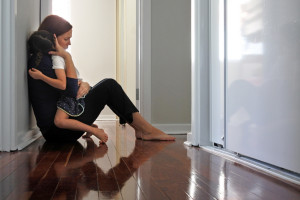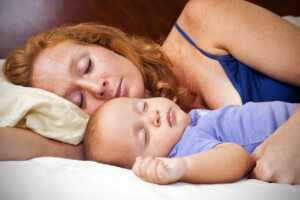Newborn babies are cute, cuddly, and smell AMAZING. But, they don’t come with a manual, and sometimes the nurses or doctors at the hospital will forget to tell you about these weird but normal things that happen in a newborn baby. It’s not until you’re home and it’s 2 am that you can find yourself asking, “Is this normal?!”
As a pediatrician and Enfamil’s Infant Development expert, I’m often asked about the weird things newborns do that shock their parents. Rest assured, these things are absolutely common and normal.
Weird (But Normal) Things About Newborns
1. What are all these spots on their face?
Baby acne. This usually develops in the first six weeks due to hormones from mom. It’s usually located on the cheeks and nose. It’s best to do nothing, as it will go away on its own, and some products can irritate the skin. If very severe or lasts beyond two months, speak to a pediatrician. We sometimes do recommend topical ointments to prevent scarring. In most babies, less is more, and it will go away one day like nothing happened.
2. What’s on their scalp?
Cradle cap. These are greasy scales on the scalp or eyebrows. Cradle cap is thought to be caused by hormones. It will go away on its own, but you can use coconut oil on the scalp and then comb with a soft brush.
3. Are those bruises?
Those are Dermal Melanocytosis (formerly known as Mongolian Spots). Those are darker spots that look like bruises but are a common skin condition in babies. They commonly appear on the sacrum area and the thighs, back, or sometimes arms and chest. These spots go away on their own, yet some people can have them slightly there in adulthood. They are more common in people with melanin in their skin and are not anything to be concerned about.
4. Why is their skin peeling so much?
They were in a water environment for nine months, and they came out dry and eventually have peeling skin! Nothing to do—it will peel off. If cosmetically bothersome to you, you can use non-fragranced baby lotion or ointment. Like a snake shedding its skin, it will all come off, leaving smooth skin.
5. What are these tremors?
Newborns have many jerky movements. When startled, they will jerk. When sleeping, they will jerk. Speak to a clinician if you notice rhythmic jerking with eye-rolling and/or jerking that cannot be stopped when you hold the extremity.
6. Why are their hands blue?
This is called acrocyanosis and is common due to normal limited blood flow to the area. This self resolves. Their feet can also be blue. They are not necessarily cold, so there is no need to use mittens. I do like onesies as nobody likes sleeping with cold feet. If there is blueness on the face or chest, please let a clinician know.
7. Why do they snore like a grandpa?
Newborns will grunt A LOT and make whimpers and sounds while they sleep. They breathe through their nose (obligate nose breathers), and breathing through your nose can mean a very musical sleep. Totally normal. If baby is awake and in distress (you see the ribs retracting fast and/or with any color change), speak to a clinician. Always put them in a safe sleep environment if you are not watching them 100%. Otherwise, no need to hover over them while they sleep (but I know you may anyways, #parentlife).
8. Why do they breathe fast and then slow?
This is called periodic breathing; however, rest assured they are breathing fine throughout. A more advanced breathing pattern will come. If constantly fast (rapid, rapid, and more rapid) with any color change or ribs retracting quickly in and out, speak to a clinician.
9. Should I give them water for these hiccups?
No. Hiccups are common, especially if you felt this in utero! Don’t startle them or make them drink water as you do for adults. It will go away on its own. You may notice it’s more prominent around feeding times because the nerve that goes down to the diaphragm can be irritated during feedings, causing the hiccup. No need to do anything differently.
10. Are they cross-eyed?
This is normal and has a lot to do with their flat noses and newborn anatomy! If it persists past six months, or one eye is worse than the other, and/or baby is not tracking objects by two months old, speak to a clinician.
11. Why do they have bumps on the base of their skull?
These are likely occipital lymph nodes. They should be small and mobile (like tiny marbles). If they are large and fixed, let a clinician know.
12. Why does their eye have discharge?
This is likely caused by a blocked tear duct. Gently wipe away the mucus. You can massage the inner eye with your clean finger or Q-tip. If it is associated with bright redness in the eye or persists past one year of age, speak to a clinician.
13. They’re always sneezing! Are they sick?
Babies commonly sneeze. This is common more in C-section babies since they didn’t have the pressure of the vaginal canal to squeeze out any fluid from in utero! If baby seems congested and bothered, use saline and suction—otherwise, monitor. Of course, if they seem unwell or have a fever over 100.4, let your clinician know!
14. Why does my baby have breast buds?
If you feel your newborn’s nipples, you may feel breast buds! Don’t worry. They’re not going through puberty. This is common. Try not to touch them or play with them. Let them be!
15. Does my baby girl have a period?
Vaginal bleeding is very common in newborn girls and may also have some mucous. It’s thought to be from maternal hormones, mimicking almost a mini period. Also common is vaginal discharge—all benign.
16. Why are my son’s testicles large?
This is called a hydrocele (fluid in the testicle) and is common. Your child’s clinician may shine a light through it to confirm the diagnosis. It goes away on its own. If you notice large testicles that suddenly develop, always speak to your clinician.
17. What is all this brick-colored dust in their diaper?
These are called urate crystals and are very common initially as feeding is established. It’s residue from the lining of the bladder. This should go away. If baby is poorly feeding and you see this, speak to a clinician. But, if they’re doing well with feedings and making wet diapers, monitor.
All of these weird things are super common (and normal). But if you’re ever concerned, always ask your pediatrician. You can bring up the concerns at routine check-ups or call the nursing line if you are very concerned. We are always happy to reassure you if needed.














